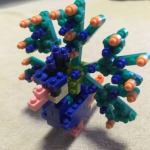-
We take a look at Django and Channels 2.0 and the changes it
brings by going fully async - Examining not only why the change
makes things better, but also how it’s managed to bridge
between Django’s synchronous world and the async world.
Plus, what might the future hold for Django and Channels?
-
Anthony I Joseph
A traveller's guide to mapping technologies in Django
Hahmann and Burghart estimate at least 60% of all information is
geospatially referenced. Fortunately, Django includes a variety
of spatial and mapping tools to help build spatially-aware
services. This talk will give an overview of geospatial concepts
for the Australian and Django communities.
-
Christopher Swenson
chris_swenson
Multi-Factor Authentication: How it works and why you need to be using it yesterday
Multi-factor authentication (MFA) and two-factor auth (2FA) are
becoming popular, but how do they work? What are the options, how
secure are they, and how do you use them in your own
applications? We’ll answer all these and more, covering
everything from Django integration to cryptography.
-
Curtis Maloney
BunkyFob
PostgreSQL Indexing : How, why, and when.
So many of the things we build depend on a DBMS to keep our data
safe, and retrieve it quickly. We know indexes can make that
faster, but… how do they work? When should you use them? What
should I index?
-
Increasingly, our apps are used not by humans but by other apps -
via their APIs. Thus your APIs need to be well-designed and easy
to consume for other developers. I will share tips and good
practices on authentication, versioning, documentation, response
structure, and why it all matters.
-
In this talk, we’ll see how we make a language agnostic
backend, to serve our app in different languages, based on what
language the client wants to communicate in. We’ll see how
to support translation for static data and dynamic data, using
various third-party services.
-
Tim Bell
timb07
Dynamic web pages without Javascript
Intercooler is a Javascript library that allows you to make
dynamic web pages without writing any JS yourself. This talk
demonstrates how to use Intercooler to add dynamic functionality
to a Django app. It will also cover a number of apps that make
using Intercooler with Django even easier.
-
Want to up your design skills? This presentation will give you
the building blocks you need to make better designs for your
websites and presentations. Aimed at design beginners and
developers.
 Lilly Ryan attacus_au
Lilly Ryan attacus_au Merrin Macleod merxplat
Merrin Macleod merxplat






